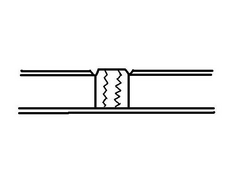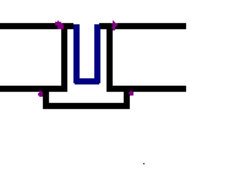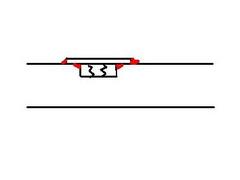Steve


Rescued attachment Threaded insert.jpg

I need a threaded bit in the centre of some RHS..
how best to do this?
do i drill a big hole, then weld a nut? or some sort of solid insert, then drill and tap?
[Edited on 13/12/05 by Jumpy Guy]
Try a Rivnut, you'll need a special tool and fitting but it's quick for the job you need
Jason
i dont think a rivnut will be strong enough; its for one of my seat mounts....
but as an afterthought- has anyone welded a rivnut in? does it work?
[Edited on 11/12/05 by Jumpy Guy]
You need to weld tube throught then tap it .
My seats are attached with riv nuts, no problems. If you use the steel riv nuts, not the alloy ones. You can actualy set them with a machine screw, some washers and a nut, to save buying a setting tool just for a couple.
There are other sources, but you should consider something like this for something critical like seat mounts
http://www.aircraftspruce.com/catalog/hapages/anchornuts.php
are these rivet-in stlye fixings better/more secure than a Rivnut?
anyone know?
Try something like this, a hole in a short length of 12mm rod, drilled & tapped to 8mm, set into a 12mm hole in the RHS, weld into place, chamfer
both edges of hole to give strength to weld. Grind weld off flush afterwards. You could go to 10mm thread in 14mm rod if you wanted more meat but I
think it would be overkill. Also hole harder to drill & tap bigger & more expensive. Probably necessary to chase threads after welding as heat
tends to shrink holes. Hope that sketch will help to make it clear.
Steve


Rescued attachment Threaded insert.jpg
IMHO a tube should be welded in instead of inserts.
Stronger to use a top-hat arrangement I think... something like:


tophatbush
(grr Paint is awful - blue is the threaded bit, purple the weld/braze)
If you can braze it rather than welding there shouldn't be any distortion to worry about.
quote:
Originally posted by kb58
IMHO a tube should be welded in instead of inserts.


quote:
Originally posted by iank
Stronger to use a top-hat arrangement I think... something like:
tophatbush
(grr Paint is awful - blue is the threaded bit, purple the weld/braze)
If you can braze it rather than welding there shouldn't be any distortion to worry about.
 , if further strength
was felt to be needed, then just drill right thru the RHS, make your piece of rod slightly longer & weld both sides.
, if further strength
was felt to be needed, then just drill right thru the RHS, make your piece of rod slightly longer & weld both sides. OK, another question on the same subject-
i need to raise my seats about an inch or so. New Triton seats with bush at each corner to bolt mount into .
so, whaddya think? do i need a 1" high runner between each corner mounting point, or will one wee RHS block under each point be stable enough?
hard to describe, anyone have any ideas?
If you have a cross piece of 1" x 1" under the front & back of your seat already & if you were to weld a short section of 1"
squ RHS on top of that ( assuming the open ends top & bottom) & if you were to have a small square of 3mm thick plate, predrilled & with a
captive nut for your seat mounts welded underneath, & then weld this to the top of your short bits of RHS, then I reckon you'd have some well
strong seat mounts, & without the hassle of drilling & tapping rod. In fact the answer to you problem could save you some hassle & still
look nice & tidy. All this assumes though that you have said cross pieces & that they're the correct distance apart for your seat mounts.
Even if they're not you could still drill bigger holes in whatever you end up with & weld the plate with captive nut to your RHS as an
alternative to previously suggested methods. HTH.
Cheers, Steve
Quick sketch of what I had in mind, could be flat on tube or on top of short piece of RHS on end.
Cheers, Steve.


Rescued attachment Captive nut.jpg
Steve,
Why not use the short sections of rhs, cut the ends at an angle, drill right size hole for bolt, hold nut on inside of tube with a nut and reach in
with the mig and spot weld the nut. I'd cap the ends of the tubes though.
Bruce.
Bruce, that was similar to my original thought to this problem but then I thought that you've two ends to plug after welding in nut. By doing it
on end, one open end of the RHS will be welded right around onto the X-member, & the other plugged by a piece of steel with a hole & captive
nut already in place. I guess I thought this would be easier. My suggestion of 3mm steel for this is probably overkill, but 2-3mm OK, easy to source
from any engineering shop as 25mm wide flat. In truth I don't think there's much in it, just I liked my way better, but then I would eh! 


Steve.
I'm not realy sure why you need to have a meaty fixing for your seats that would require anything much more than a Rivnut.
What loading will it take if you are in an accident? You are sat on top of it and strapped in with your seat belts the seat isn't going very far
IMHO.
regards
Keith
Keith, while in theory what you say may seem true, there is a surprising amount of stress on seat mounts caused by simply climbing in & out,
travelling over bumps & around corners, good strong mounts are essential in my mind to prevent the possibility of a seat coming free & causing
loss of control. I'm sure there are those who will Poo Poo this but heck, I'm just a belts & braces kind of guy & can't see the
point in going light when good strong solutions are very simple & contribute a neglible amount to all up weight. This is one area not to save
weight in to my mind.
Steve.
[Edited on 15/12/05 by Steve Hnz]
And don't forget the possibility of a rear end shunt when all the loading goes through the seat and it's mounts, not the harness.
Mick
quote:
Originally posted by Jumpy Guy
are these rivet-in stlye fixings better/more secure than a Rivnut?
anyone know?
My normal method for installing seat belts mounts is as follows:
Get a piece of 3mm thick steel about 50mm x 100mm (size depends on the chassis rail) , drill a 7/16" hole in the middle, weld a 7/16" UNF
nut on.
7/16" UNF is the thread to suit harness eyes.
Drill some more 6mm holes in the plate (for rossette welds).
Then I will cut a hole in the chassis rail for the nut, and site the plate onto the chassis rail and weld it into place, including welding through the
6mm holes.
I also try to arrange the plate so it is in shear and not tension. In other words weld the plate on the side of the rail and not the top for the waist
belts.
John
I agree with the talented Mr Beardmore. Always done things that way and haven't once fallen out of a harness yet
I've always used 3mm plate, but purely because i seem to have lots lying about 
PS Keep up the good work John.
quote:
Originally posted by Jumpy Guy
I need a threaded bit in the centre of some RHS..
how best to do this?